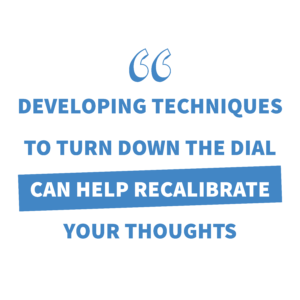We’ve all got our go-to social media accounts when we’re looking for a good laugh or just need a bit of cheering up.
I started at Faces In Things (@faceinthings), moved on to Angry People In Local Newspapers (@angrypiln), then Fake Showbiz News (@FakeShowbizNews).
My most recent Twitter jam, though, has been The State Of LinkedIn (@StateOfLinkedIn).
For the uninitiated, it’s a glorious conveyor belt of humble-bragging, people livin’ their best LinkedIn life (Porsches and Rolexes in pics a must) and supreme takes on the Fresh Prince of Bel-Air theme tune (really).
It can be funny. It can be painful. It can make you believe the human race is doomed.

Delusional positivity
Recently, I also stumbled across the concept of delusional positivity – and began to wonder if these LinkedIn ‘legends’ might be on to something.
In his book Soundtracks, a brilliant guide on how to overcome overthinking, author Jon Acuff explains how the term delusional positivity was deliberately crafted by an American advertising agency.
They believe that a “relentlessly positive attitude” is what keeps them moving forward and pushing the boundaries of possibility.
The word delusional was chosen very much on purpose. Aware of people’s innate cynicism around the topic, they wanted to make it easier to digest and more accessible.
Cod psychology or inspirational thinking?
The science bit
Harnessing the power of positive thinking is nothing new, but nor is it something created to help life coaches and self-help gurus shift books.
The impact of words on our actions and behaviours is eerily powerful. One famous study involved two groups being asked to make sentences out of seemingly random words. One group’s list contained words like bald and wrinkle.
Then, when asked to walk down the corridor after the test, those whose lists included the words associated with old age walked at a far slower pace.
This effect is known as priming – the ability to cause a physical change through thoughts. In truly scientific terms, this is also known as the ideometer effect – how our thoughts and ideas influence our actions.
Think yourself happy?
If there is one thing the repeated displays of self-promotion on the State of LinkedIn have in common, it is overwhelming positivity.
Sure, confidence in the wrong hands can translate to arrogance, but there’s little doubt that these characters have grasped the concept of delusional positivity – and, for better or worse, have shared it with us. Ask them the secret of their success and you’d guess a “relentlessly positive attitude” is likely to be high on their list of responses.
So how can we grab ourselves some of this mental nectar being supped on LinkedIn? The Soundtracks book has a few handy suggestions….
1. Change the record – the core belief at the heart of the book is that we need to retire and replace our broken soundtracks – unhelpful, distorted truths we hold on to that serve us no purpose. One of our biggest mistakes we can make, Acuff argues, is assuming all our thoughts to be true. Change them to a more positive or realistic soundtrack and you really can begin to think yourself happier.
You might already do this or have a different name for it – an old boss was forever telling me to ‘reframe’ things. But whatever you call it, it works. Soundtracks author Jon Acuff replaced a soundtrack about a difficult task to it being ‘light and easy’ instead, making it far more approachable. I recently started to replace the soundtrack of something being stressful or pressurised with it being my energy and motivation. Believe me, it makes a massive difference.
2. Develop a gratitude attitude – starting to change your soundtracks encourages you to start viewing things through a new, kinder lens. We all know how easy it is to focus on the negative – a colleague’s behaviour, a boss’s decision you don’t agree with.
But there’s always a flipside to everything – and also perspective worth applying. That person may be a pain, but they may also be brilliant at what they do. That decision may have annoyed you, but it may be the best thing for the long-term. Try and change your soundtracks about people and your experiences to focus on the positives. Acuff borrowed a typically understated quote from Kayne West – “My life is dope” – to kickstart his gratitude attitude. It’s not a bad place to start.
3. Turn down the dial – the biggest, self-defeating element of overthinking and negative thoughts, argues Acuff, is thinking of them as a switch. That they are something that can eventually be turned off.
And that belief is a one-way ticket to unhappiness, as sadly you’re never to going to completely stop negative thoughts. Instead, we need to think about them as a dial – something that you can turn the volume down on, if things get too loud.
Developing techniques to turn down the dial can help recalibrate your thoughts. Everyone will have different things that work for them, but making them easy and accessible is important so you can turn to them when you need them. For some people it might be exercise or enjoying a craft or hobby. For some it might be making a list to get stuff out of your head. Sometimes, choosing a dead simple task that you can finish (e.g making a cuppa or hanging out some washing) is enough to pull you out of a sticky mental block and provide the motivation to get back on track.
There’s no guarantee these techniques will have you posting about your new Porsche on LinkedIn anytime soon, but we’d probably just all settle for just being that bit happier, eh?
We’ve found a few examples from @StateofLinkedIn for you to enjoy…






















